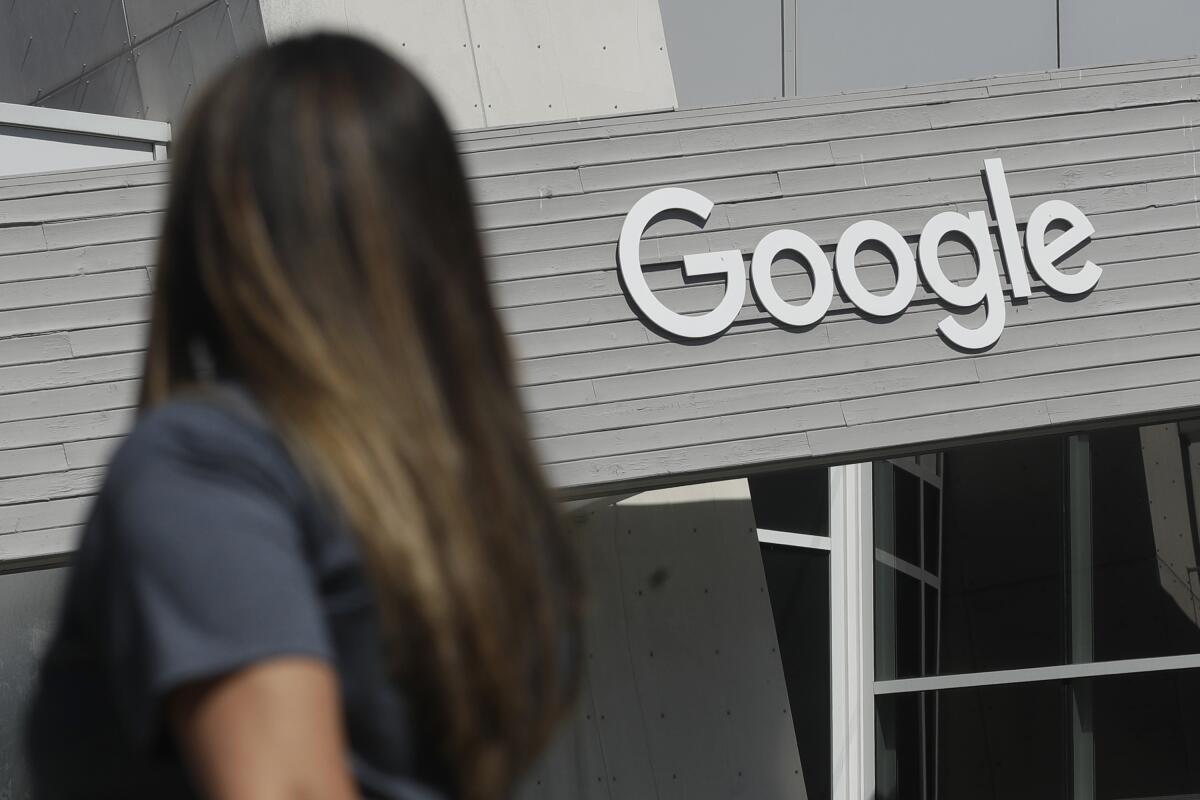Opinion: Russia prepares to test its new censorship tool on Google. Tech giants should not give in

Russian authorities appear to like the new tool they’ve developed to pressure foreign tech companies. It made its debut two months ago, when authorities used it to throttle Russian internet users’ connections to Twitter after the social media outlet failed to remove content the Kremlin didn’t like. Now Russia’s internet regulator, Roskomnadzor, is threatening to slow down traffic to Google sites for the same reason.
According to Roskomnadzor, Google wouldn’t delete up to 30% of the links to information prohibited by the Russian government that the regulator instructed the company to remove. On Monday Roskomnadzor said that it would give Google 24 hours to comply with Russian laws. The company didn’t react, and the next day it was fined $81,600. Two days later, it was fined again, $47,600. These are minuscule fines for Google, which collected more than $44 billion in advertising revenue just in the first three months of the year. And so far, there has been no indication that Google is taking down the links. So the Russian government may be motivated to take more drastic actions against Google.
But why is Google not rushing to remove information the Russian government wants to ban? Roskomnadzor described prohibited content in nefarious terms, such as “sites of terrorist and extremist organizations, sites with pornographic images of minors, and also online stores selling drugs.” The implication is that Russian authorities are looking out for their vulnerable constituents and that Google is just an evil, profit-hungry American corporation.
What Roskomnadzor neglected to mention, however, is the government also demanded that Google delete videos on its YouTube subsidiary that called on Russians to participate in peaceful unsanctioned protests in support of the imprisoned opposition leader Alexei Navalny.
Google evidently is not ready to give up easily. In April, the company filed its first-ever lawsuit against Roskomnadzor over the censorship.
It’s important to understand the context for these fights. The Kremlin started to tighten control over the internet after the anti-government protests of 2011, the biggest ones since the fall of the Soviet Union. Then in 2019, Russian President Vladimir Putin signed the “sovereign internet” law, a step toward enabling Russia to disconnect its internet from the rest of the world. The government portrayed the move as a way to protect Russians if the U.S. and other western countries decided to cut the country off from the internet. Technically, however, no country or entity controls access to the sites that make up the internet; that’s managed by international organizations and the companies operating domain name servers. And Russian authorities have other reasons for seizing more control over internet use: to increase censorship and silence dissent, the scenario Kremlin critics were afraid of.
The “sovereign internet” law opened the door for Russian authorities to test their new website-throttling technology. Major protests in January and April in support of Navalny might have triggered the government to ramp up pressure on tech companies, including social media networks, the primary place for opposition groups to coordinate rallies.
Roskomnadzor started with Twitter. In March, the internet regulator started to slow the speed for uploading photos and videos to Twitter in response to the company’s failure to delete content targeted by the government. At the same time, Russian courts imposed fines on Twitter, including a $117,000 penalty for not deleting posts that contain calls to participate in anti-Kremlin protests. “We are deeply concerned by increased attempts to block and throttle online public conversation,” a Twitter spokesperson said to Reuters in March.
Roskomnadzor appears to be winning that battle. After two months of slowing down the platform, the Russian internet regulator declared that Twitter removed 91% of the prohibited information. Roskomnadzor promised to keep slowing down social media until it censors 100% of the material unwanted by the government.
Although these developments are discouraging, Telegram’s ability to resist government pressure can serve as an example for other tech companies. Telegram is an anonymous mobile messaging app with plenty of channels used by Russian opposition groups. Roscomnadzor tried in vain to block it for two years before giving up because Telegram kept providing users with tools to circumvent the ban.
Nevertheless, the government’s moves against Twitter and Google are a dangerous trend, and they show that the Kremlin is becoming more experienced in eliminating content that doesn’t support its goals. It is important for tech giants to stay committed to the open internet and do everything in their power not to allow the manipulation of information.
More to Read
A cure for the common opinion
Get thought-provoking perspectives with our weekly newsletter.
You may occasionally receive promotional content from the Los Angeles Times.










